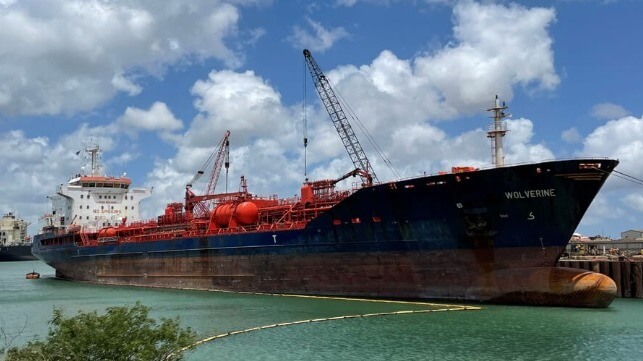First EU Ship Recycling Project Completed in Texas

Texas’ shipbreaking industry recently achieved a milestone by completing the recycling of the first EU ship meeting the stringent standards of the European Union and positioning the Brownsville operation of International Shipbreaking as an alternative in the recycling industry. Increasing environmental regulations are expected to accelerate the pace of ships retiring in the next few years but EU shipowners have been mostly limited to the Turkish yards or required to work with middlemen who take steps to skirt EU regulations for the disposal of ships.
“The success of the project at the ISL yard opens up a new frontier in efforts to reduce the number of end-of-life vessels that are broken up in rudimentary and often very unsafe conditions on the beaches of South Asia,” according to the executives from EMR Group, the parent company for ISL. They noted that until recently over 90 percent of merchant vessels were being dismantled in Southeast Asia even though the yards have not achieved EU accreditation. Currently, the large accredited breakers are in Turkey although several smaller operators are also seeking to enter the market.
“Around the world there are still too many ships that end their days being recycled in dangerous and environmentally-harmful yards on the other side of the world. By continuing to raise our standards, ISL is showing responsible ship owners there is a better way to do business,” said Chris Green, ISL Senior Manager.
Last year, ISL invested to make its site in Brownsville, Texas, compliant with EU regulations making it available for EU shipowners and ships flying the flags of EU member states that must be dismantled in accredited shipbreaking yards.
The first vessel to take advantage of the new option was MT Wolverine, a chemical tanker built in 2006 by Aker Tulcea in Romania and operated under the Norwegian flag. The 518-foot-long vessel, which had a carrying capacity of 16,000 tonnes, arrived at the Texas recycling yard in January 2021 and was one of 28 projects undertaken by the company during the past year.
The EU regulations set standards for environmental and health and safety compliance. Part of the requirements is that ships must be completely recycled on hard surfaces to avoid pollutants such as chemicals from paints contaminating the soil and water. The yards are also required to maximize the recycling of materials and properly handle all material from the vessels.
According to ISL, the MT Wolverine recycling project was undertaken in full compliance with the EU regulations with all waste materials removed from the tanker disposed of following the EU requirements. Using innovative and sustainable recycling processes, ISL reports it was able to recycle 97 percent of the materials removed from MT Wolverine.

that matters most
Get the latest maritime news delivered to your inbox daily.
“By investing $30 million in the latest technology, equipment, and infrastructure, our business has become the first in the U.S. to be able to recycle ships to a level compliant with the EU SSR. MT Wolverine shows that this effort and commitment is paying off,” noted Green.
ISL has the capacity to safely moor and recycle ships over 1,200 feet in length and 158 feet wide. The company was established in 1995 and since then it has handled over 100 vessels at its 43-acre yard that can handle up to nine ships at a time. ISL is best known for providing a recycling service to the U.S. Navy. The company was recently contracted to recycle the famed aircraft carriers Kitty Hawk and John F Kennedy as well as previously conducting the recycling operations for Navy vessels including Constellation, Ranger, and Independence. With the new EU compliant operation, the facility is targeting additional work for the commercial sector.
